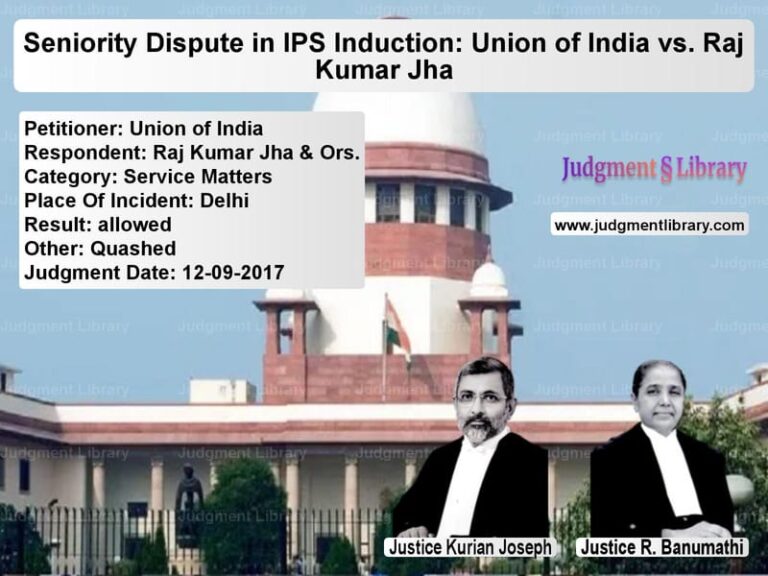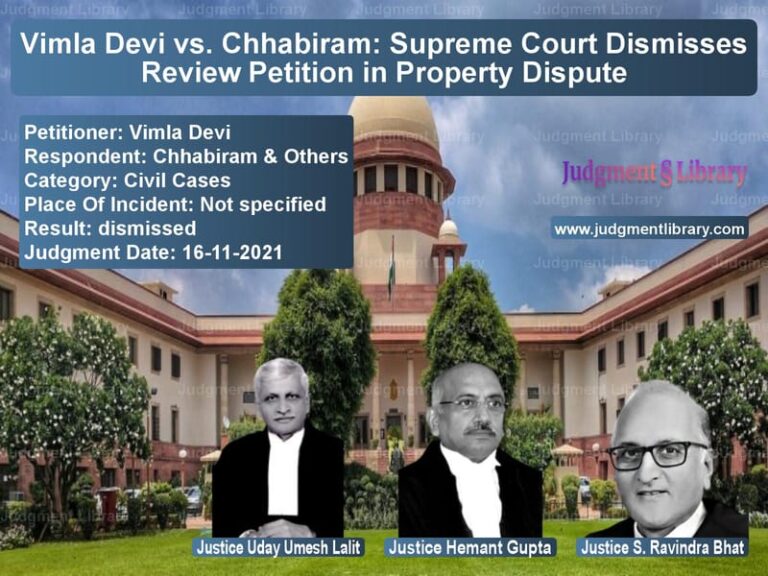Union of India vs. Bharat Fritz Werner Ltd.: Supreme Court Ruling on Bid Evaluation and Discriminatory Allegations
The case of Union of India vs. Bharat Fritz Werner Ltd. & Another centers on the legal implications of remarks made by the High Court of Delhi regarding the evaluation of bids in a tender process. The Union of India filed appeals against certain observations made by the High Court, where the court granted permission to the petitioner (Bharat Fritz Werner Ltd.) to make representations to the Prime Minister regarding the alleged discrimination faced by Indian bidders in public procurement processes.
Background of the Case
The respondent, Bharat Fritz Werner Ltd. (BFW), filed a writ petition before the High Court of Delhi challenging the Letter of Acceptance (LoA) issued by the Union of India on June 5, 2020, in favor of another company, respondent no.2, for a tender under ICB Ref. No. 21/TCSP/GOODS/P41/2018/TR/TC (Package-41). The dispute centered around the wrongful evaluation of bids and alleged discrimination against Indian manufacturers.
The High Court, while disposing of the writ petition, did not entertain the petitioners’ plea on the merits but allowed the petitioners to raise their concerns in the form of a representation to the Prime Minister. In its order dated January 19, 2021, the High Court observed that Indian bidders were being unfairly discriminated against, even though the tender conditions stipulated a preference for Indian manufacturers. The High Court’s remarks led to the Union of India filing appeals against these observations, arguing that they were unnecessary and unwarranted in the context of the case.
Petitioner’s (Union of India) Arguments
The Union of India, represented by the Additional Solicitor General, made the following key arguments in its appeal:
- The High Court’s observations regarding discrimination against Indian bidders were beyond the scope of the writ petition and were made without any direct evidence.
- The tender process was duly followed, and the evaluation was done based on the set criteria, which were publicly disclosed.
- The observations made by the High Court regarding discrimination could have a negative impact on the integrity of the procurement process.
- The discretionary powers granted to the High Court in such cases should be exercised cautiously, and sweeping generalizations should be avoided.
Respondent’s (Bharat Fritz Werner Ltd.) Arguments
The respondent, Bharat Fritz Werner Ltd., countered with the following arguments:
- The observation made by the High Court was made in the context of the petitioner’s genuine concerns regarding the wrongful evaluation of bids and the preferential treatment given to foreign bidders over Indian manufacturers.
- The representation to the Prime Minister was a reasonable and constructive course of action, and the High Court’s remarks were in line with the policy of promoting “Make in India” and supporting Indian manufacturing.
- The tender conditions clearly stipulated that Indian manufacturers would be given preference, yet this was not followed in practice, resulting in discriminatory treatment.
Supreme Court’s Analysis and Observations
The Supreme Court carefully reviewed the High Court’s order and its observations regarding the discrimination of Indian bidders. The Court made the following observations:
“The High Court’s observations regarding the wrongful evaluation of bids and discrimination against Indian manufacturers, though well-intentioned, were unwarranted in the context of the case. The Court should refrain from making sweeping generalizations that are not directly supported by the case at hand.”
The Court emphasized the principle that courts should avoid making general observations in cases where the issue at hand does not warrant such sweeping remarks:
“In cases like these, where a writ petition has not been decided on its merits, it is important for the Court to restrict itself to the issue directly in dispute between the parties. The High Court’s remarks were beyond the scope of the dispute and not necessary for resolving the petition.”
The Supreme Court also pointed out that:
- The discretionary powers of the Court should not be used to make unnecessary observations, especially when they affect broader public policy and governmental decisions.
- It was inappropriate for the High Court to involve the Prime Minister’s Office in what should have been a matter for administrative resolution.
- The Union of India’s appeal was valid in seeking the expunging of the High Court’s observations, which were not directly relevant to the case at hand.
Supreme Court’s Final Ruling
The Supreme Court ruled in favor of the Union of India, partially allowing the appeal and expunging the High Court’s observations. The Court stated:
“The remarks made by the High Court were unwarranted and beyond the scope of the case. Therefore, they are hereby expunged.”
However, the Court also acknowledged that the issues raised by the petitioner regarding discrimination against Indian bidders were valid and should be addressed through appropriate channels. The Court did not, however, order any further investigations or actions on these issues.
Implications of the Judgment
This judgment has several implications for public procurement processes and the role of the judiciary in overseeing government contracts:
- It emphasizes that courts should refrain from making broad, sweeping remarks in cases where they are not directly relevant to the dispute.
- It reaffirms the importance of administrative fairness in government contracting and the need for judicial restraint in interfering with the process unless there is clear evidence of illegality.
- The case reinforces that discrimination against Indian manufacturers should be taken seriously, but the matter should be addressed through appropriate policy and regulatory mechanisms rather than court observations.
Conclusion
The Supreme Court’s ruling in Union of India vs. Bharat Fritz Werner Ltd. sets an important precedent regarding the role of the judiciary in cases involving public procurement and the evaluation of bids. The judgment highlights the importance of judicial restraint and the need for courts to limit their observations to the issues directly before them. While the concerns about discrimination against Indian manufacturers were valid, the Supreme Court emphasized that such matters should be dealt with through appropriate administrative procedures and not through general judicial observations.
Petitioner Name: Union of India.Respondent Name: Bharat Fritz Werner Ltd..Judgment By: Justice M.R. Shah, Justice B.V. Nagarathna.Place Of Incident: Delhi.Judgment Date: 17-02-2022.
Don’t miss out on the full details! Download the complete judgment in PDF format below and gain valuable insights instantly!
Download Judgment: union-of-india-vs-bharat-fritz-werner-supreme-court-of-india-judgment-dated-17-02-2022.pdf
Directly Download Judgment: Directly download this Judgment
See all petitions in Company Law
See all petitions in Corporate Compliance
See all petitions in unfair trade practices
See all petitions in Judgment by Mukeshkumar Rasikbhai Shah
See all petitions in Judgment by B.V. Nagarathna
See all petitions in partially allowed
See all petitions in Modified
See all petitions in supreme court of India judgments February 2022
See all petitions in 2022 judgments
See all posts in Corporate and Commercial Cases Category
See all allowed petitions in Corporate and Commercial Cases Category
See all Dismissed petitions in Corporate and Commercial Cases Category
See all partially allowed petitions in Corporate and Commercial Cases Category







